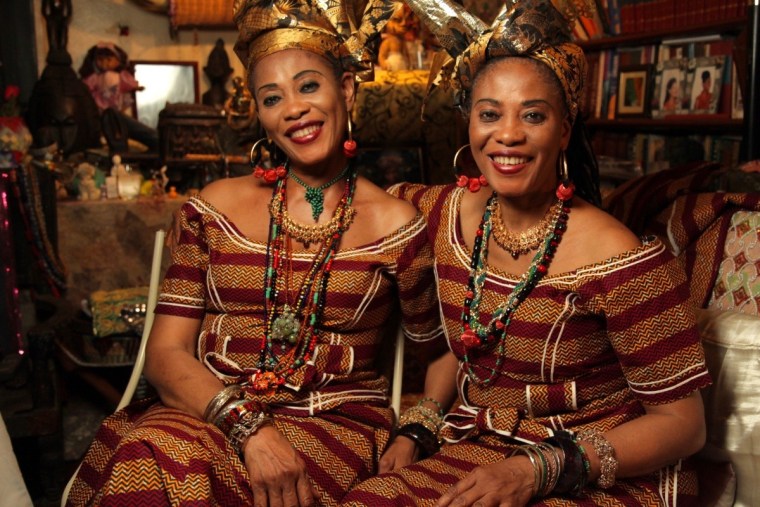On the 9th of November 2019, Kehinde Lijadu passed away from causes that are not yet clear. While some reports claim she died from a severe stroke, others say she suffered from cancer before she passed. Kehinde was 71. She was also one half of an Afro-Pop duo called the Lijadu Sisters: a twin sister to Taiwo Lijadu. The two women were a pair who pioneered an audacious, multifaceted genre of Nigerian music in the 1970s and 80s.
Born on the 18th of September, 1948 and raised in Ibadan in the 50s, the twins developed their love for music under the influence of traditional family beliefs and a mother who nurtured their talent; cautioning them to ‘write the type of music that people will always hear hundreds of thousands of years later and still [be able to] relate to.’ The girls grew up listening to eccentric rock and pop icons like Elvis Presley, Ella Fitzgerald, the Beatles and Cliff Richard. By the time they were 10 years old, Kehinde and Taiwo Lijadu were singing together.
Between 1969 and 1989, the Lijadu Sisters enjoyed a muted kind of fame. In 1969, they demanded their own studio time and released their first studio album, Iya Mi Jowo (“Mother, Please”). They released six albums in total. In 1972, they performed at the Olympic Games in Munich, singing with the British drummer, Ginger Baker and his band, Salt. In 1976, the Lijadu Sisters worked with Biddy Wright to create their Danger album. By 1988, the twins had attracted enough attention to warrant a review in the New York Times.
Read more on Entertainment
In spite of international recognition, the Lijadu Sisters struggled to place themselves firmly in the Nigerian music scene. They had to deal with the hostility of a male-dominated industry. The twins confessed their struggle to a British reporter from The Guardian in 2014:
“After we made our record, we tried to find a way of having our own band, but at the time we had a lot of obstacles from men. They would tell us that we were not coming here to stay. Now those people acknowledge that they were scared of us because we were very independent.”
-Lijadu Sisters
The Lijadu Sisters appeared in a 1980 documentary called Konkombé: The Nigerian Pop Music Scene. In the documentary, we see the twins in a collection of clips and interviews that showcased other popular Nigerian stars like King Sunny Ade, Fela Kuti, Sunny Okosun, and I.K Dairo. Through the Konkombé documentary, the Lijadu Sisters played a significant role in establishing ‘World Music’ as a genre. But the significant number of men in the documentary speaks truth to the fact that successful female musicians were rare in the Nigerian music scene at that time.
In 1996, Kehinde suffered a nasty fall that seriously damaged her spinal cord. The Lijadu’s time in the limelight ended with that fall. The sisters had to take some time off pursuing their music so that Kehinde could recover. But they never truly made a comeback. In 2006, Nas (a popular American rapper) sampled a track from the Lijadu Sister’s Danger album, a song called Life’s Gone Down Low, and gave them no credit or recognition. Attempts were made to push their music back into circulation between 2009 and 2012, but these attempts received almost no reaction. They emerged again in 2014, sang in London, appeared on The Tonight Show Starring Jimmy Fallon and retreated into anonymity that finally concluded their career.
Sign up to the Connect Nigeria daily newsletter
Kehinde and Taiwo Lijadu sang sarcastically and passionately about Nigeria’s social issues. They were bold and flirtatious, capturing the attention of anyone who listened to them with a strange blend of music that combined rock, jazz, pop, afro-beats, and afro-soul. In a song like Cashing In from the Danger album, they mocked the exploitation of social ills with blunt words: “We’re cashing in. Still. Poverty is a common sight.”
Even though they are little known today, the Lijadu Sisters were one of the popular acts of Nigeria’s blossoming music scene in the 1970s. Kehinde Lijadu’s death seals a tragic and mortal end to the Lijadu Sisters.
Sources:
The Cable lifestyle
KZSC Santa Cruz
Searchworks.stanford.edu
Music in Africa
The Guardian
Featured Image Source: The Fader
Got something you want to read about on our platform? Contact us: [email protected]


